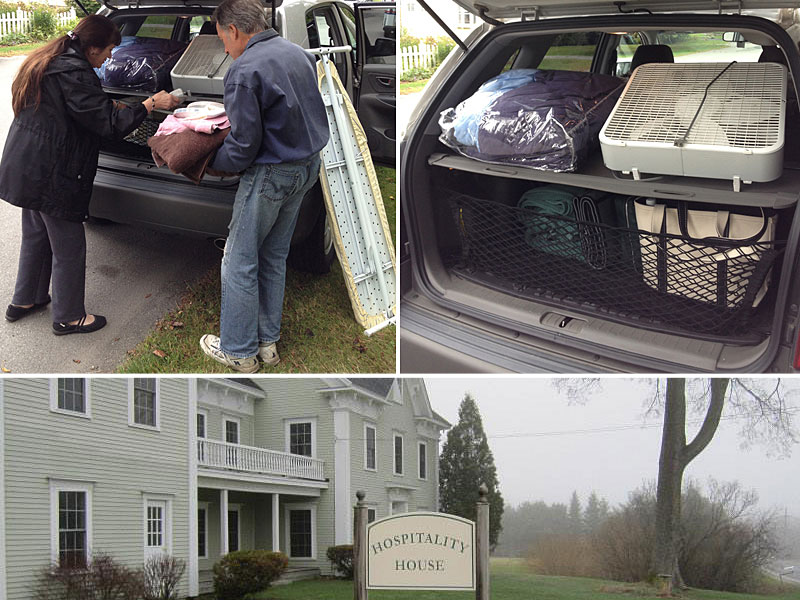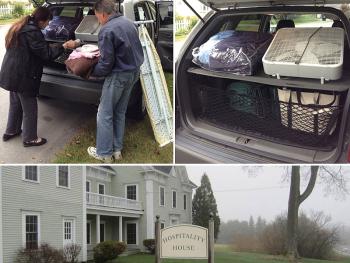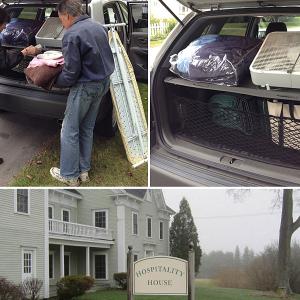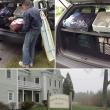Amy Libby: Giving a fish
 Volunteers Leigh and Ron Smith load bed linens and miscellaneous house furnishings from a residence in Camden for donation to Hospitality House. Donations of furniture, non-perishable food, new and gently used linens, blankets and quilts, rugs, twin and full beds, towels and more are currently being sought by Hospitality House. Call 230-6628 to arrange a local pickup or for information on dropping off a donation. (Top photo by Holly S. Edwards/Bottom photo courtesy Hospitality House)
Volunteers Leigh and Ron Smith load bed linens and miscellaneous house furnishings from a residence in Camden for donation to Hospitality House. Donations of furniture, non-perishable food, new and gently used linens, blankets and quilts, rugs, twin and full beds, towels and more are currently being sought by Hospitality House. Call 230-6628 to arrange a local pickup or for information on dropping off a donation. (Top photo by Holly S. Edwards/Bottom photo courtesy Hospitality House)
 Volunteers Leigh and Ron Smith load bed linens and miscellaneous house furnishings from a residence in Camden for donation to Hospitality House. Donations of furniture, non-perishable food, new and gently used linens, blankets and quilts, rugs, twin and full beds, towels and more are currently being sought by Hospitality House. Call 230-6628 to arrange a local pickup or for information on dropping off a donation. (Top photo by Holly S. Edwards/Bottom photo courtesy Hospitality House)
Volunteers Leigh and Ron Smith load bed linens and miscellaneous house furnishings from a residence in Camden for donation to Hospitality House. Donations of furniture, non-perishable food, new and gently used linens, blankets and quilts, rugs, twin and full beds, towels and more are currently being sought by Hospitality House. Call 230-6628 to arrange a local pickup or for information on dropping off a donation. (Top photo by Holly S. Edwards/Bottom photo courtesy Hospitality House)
ROCKPORT — There are many reasons a person can become homeless. Poverty, stagnant or falling incomes, less secure jobs that offer fewer benefits, declining public assistance, excessive wait lists for housing assistance programs, and deficiencies in affordable housing paint part of the picture. Other factors include a lack of affordable health care where a serious illness or disability can start a person or family's descent to homelessness, domestic violence that forces the victim to choose between homelessness or their abusive relationship, reduced access of supportive housing for the mentally ill and displacement caused by addiction.
As a social worker serving this community since 1998, I have provided witness to each of these circumstances. I have sat with individuals as they tell their story, with downcast eyes, of how they came to be homeless. They often reflect shame about their situation and that they are in a position of asking for help. They regularly see themselves as a burden to their friends and family, having often stayed longer with these people than they felt comfortable doing. They have frequently availed themselves of options that may have made them victims or put them at risk. They often describe having done everything that they know to do to fix their problem and feel stuck and without further options. They are frequently looking to me to rekindle a sense of hope. It is this hope that allowed them to walk through my door.
I have found over the years that co-manufacturing hope has become increasingly more difficult. In the earlier days of my career there were several lines of defense in helping someone with a housing crisis. It was not uncommon to find that the organization I worked for had some pocket of financial resources to assist a person temporarily while natural supports, public housing assistance and affordable housing resources could be accessed. There were also state and community resources that could be garnered that could help a person move out from a place of temporary homelessness. Over the years, both internal and external resources have diminished and become harder to access. Further, the amount of assistance those resources are able to provide have become less and less. Ultimately, the culmination of my challenge to help was the closing of the Knox County homeless shelter, the Hospitality House, one of the last lines of defense in addressing homelessness in our area.
There is a quote that many people are familiar with: Give a man a fish and you feed him for a day. Teach a man to fish and you feed him for a lifetime. Some may wonder whether the financial resources and programs that we have utilized to address homelessness have done more the former than the latter. That argument may be true. I will attest though to the difficulty in finding the teachable moment when the person you're sitting across from is carrying the stress of not knowing where they will rest their head at night. I will also attest to the helplessness I have felt in not having an immediate resource other than empathy to offer the person that walks through my door.
The Knox County Homeless Coalition is a nonprofit formed by a volunteer collaboration of organizations and individuals committed to serving the homeless population of Knox County. The KCHC is currently working to reopen the Hospitality House with new programming that will both offer a person a fish, but also provide teaching to help a person resolve their homeless situation over the longer term. For more information on how you can help this endeavor, visit Facebook.com/hospitalityhouseKCHC.
Fundraising efforts are continuous for the support of the Hospitality House and the Knox County Homeless Coalition. To contribute, make checks out and mail to Knox County Homeless Coalition, P.O. Box 1696, Rockland, ME 04841.
Event Date
Address
169 Old County Road
Rockport, ME 04856
United States























